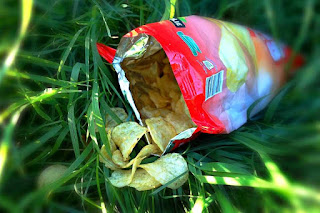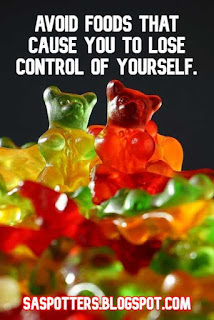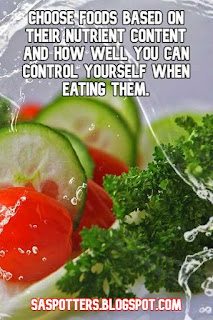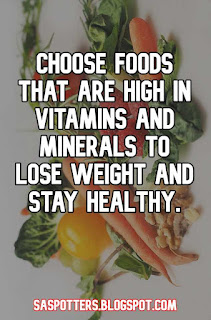 |
| Use food to enhance your goals. |
This article is written by Rob Maxwell, M.A. Exercise Physiology, CSCS and ACSM CPT from www.fittothemax.net. Follow him on Twitter.
Are there forbidden foods that you should avoid when dieting and trying to lose weight?
If you are asking this question, you’re probably hoping there is a simple yes or no answer.
As with almost everything in life, it’s not that simple. There are a lot of grey areas here.
The answer is yes and no.
There are no forbidden foods to lose weight physiologically (physically).
There might, however, be forbidden foods to lose weight psychologically (mentally).
Foods to avoid when trying to lose weight
Before I get into this exact question, I need to clear up some misconceptions about 'bad food' and 'good food'.
Fad diets
We’ve all heard about fad diets.
A fad diet drastically limits or cuts out one of the macro nutrients completely.
Macro nutrients are carbohydrates, proteins, fats, and water.
Fad diets tend to be the diets that we can’t stick with for prolonged periods of time because our health starts to decline as a result of the diet.
They should be avoided. They are not the way to go about long-term fat loss and maintenance.
Let’s take the ever-popular low carb diet. I hate to break it to you, but a low carbohydrate diet is a fad diet.
Should you monitor and limit your carbs? Yes. Should you avoid them altogether? No!
 |
| You need carbohydrates. |
How to lose weight with food
Energy consumed must be less than energy used if you want to lose weight. It's as simple as that.
Energy in food is measured as calories.
You need to eat fewer calories than your body needs to lose weight.
It’s that simple; yet it is that hard at the same time.
It’s simple because the concept is simple. The science is simple.
It is hard because we really have to be disciplined to eat less than what we want, and often what we think, we need.
Discipline is a very hard muscle to flex at times.
 |
| Self-control is important. |
No foods are forbidden for weight loss
There are no 'bad foods' (although there are foods that are better for you than others).
Carbohydrates give you energy. They give you energy for your whole body, including your muscles and your organs.
Your brain relies on carbohydrates exclusively for energy.
Your brain needs carbohydrates for energy
Have you ever had a brain fog on a low carb diet?
The reason for that is because your brain was running low on glucose. Glucose is a simple carbohydrate.
When you cut carbs back too much, your body will take glucose from the glycogen in the muscles and break down your muscle tissue.
This is called gluconeogenesis. This is one of the primary ways that people lose muscle when they diet.
Losing muscle is counterproductive to long-term weight maintenance. The more muscle tissue you have, the higher your metabolism will be. Muscles consume more calories.
Our diet should be around 45-65% carbohydrates. Those carbohydrates should be complex carbohydrates.
 |
| Stay healthy. |
The importance of fat for health
Fat gives you energy for low intensity activities like walking. It assists in hormone production among other things. You need fat.
Saturated fat (fat from animal products) has been shown to increase the risk for heart disease and diabetes when it is over consumed in the diet.
Not all fat is bad. Unsaturated fats (from plants) have not shown to have the same effect on heart health.
As they say, everything in moderation. We don’t need to eliminate fats. Our diet should be around 20-35% fat.
 |
| Eat enough fat. |
Eat enough protein for good health
You need protein for growth and repair.
Protein is generally the most over-consumed macro nutrient in an average American’s diet - even in the fitness world.
Our diet should be around 10-20% protein.
Many health and fitness trainees (and trainers) over consume protein. They think that it will make them 'grow'.
In truth, if you are deficient in protein, you won’t 'grow'. You also don’t need nearly as much protein as you think that you do.
Balanced food and calories cause muscles to grow.
If you eat too much protein, just like any other macro nutrient; you will store it as fat.
Too much protein is very hard on the kidneys.
 |
| Don't eat too much protein. |
There is no such thing as a bad macro nutrient
There aren't 'bad' foods.
There aren’t bad macro nutrients, either.
Get enough of the nutrients that you need. Cut back appropriately on calories.
Those are true statements from a physiological (physical) standpoint.
We are not just physical beings. We are psychological and emotional beings as well.
The easy answer is this: Eat any food that you want in moderation!
 |
| Moderation wins the game. |
Some foods are more beneficial than others
Having said that, are there foods that are more or less beneficial to you when you are trying to lose weight and/or begin a health and fitness program? Yes.
I believe that the psychological aspect of a diet is the toughest part for people to master.
When you consider that there are psychological responses to food, there are certain foods that you should avoid when you want to lose weight.
This isn’t true for everyone. For some people, food is just food. They do not get a lot of pleasure from it. They don’t the overeat foods that they like.
Whether you should avoid certain foods while dieting depends on what happens to you emotionally once you taste a 'trigger' food.
 |
| Avoid your soft spots. |
Everybody is different when it comes to food
Everybody is different, but most people can be divided into two main categories when it comes to this food.
Can you eat a small serving of chocolate ice-cream and stop at just a small serving?
If you answer no, you should avoid trigger foods.
For someone else, they may have zero issues having a small treat like that every day while they are dieting and it never causes them to overeat.
Find a strategy that works for your personality
One method might work very well for somebody. That doesn't mean that it will work for you.
Only you know what is more likely to be your best strategy. I use ice cream as an example, but it could be something else. We tend to over eat carbohydrates.
It is not because carbohydrates are evil. It’s because they taste good and are easy to over eat. They are very cheap as well.
Would you rather over eat tasty rolls, or hamburger meat?
Carbohydrates set off a blood sugar rise. This creates more of an insulin spike and has the potential to increase cravings.
That doesn’t mean that carbohydrates are bad. It just means that you must be aware of how you respond to certain ones.
Simply choose carbohydrates to eat that don’t cause triggers.
As I have already said, we all need carbohydrates. Let me give you an example.
A sweet potato is a great source for complex carbohydrates. If you eat a baked sweet potato, it comes in a nice little package that makes it harder to overeat.
Rice, which is also a great source of carbohydrates, can be more of a challenge to control because it’s harder to control the serving size. How big is your serving spoon? How many scoops of rice do you put on your plate? How much rice are they serving you at a restaurant?
Do you see my point? They are almost equal in calories and nutrients (serving size to serving size), but one is harder to control the actual serving size.
 |
| Choose according to your own strategy. |
Choose foods according to nutrient density
Another thing to understand is the distinction between nutrient dense and calorie dense food.
If you want to lose weight, choose as much nutrient dense foods as possible. You will get more out of every meal nutritionally - with fewer calories.
Nutrient dense foods are high in nutrients like vitamins and minerals and low in calories.
Broccoli is a nutrient dense food. Calorie dense foods are high in calories, yet low in micro nutrients. Peanut butter is an example of this.
You would have to eat a 3-pound bag of broccoli to get the same number of calories that are in one tablespoon of peanut butter.
When we eat more calorie dense foods, we tend to eat more than we need.
Can you eat a lot of calorie dense foods like peanut butter? Of course you can. But can you control how much of this you’re eating?
Only you know if you can.
 |
| Choose food that nourishes you. |
Final word of advice
Be careful of 'experts' that push absolutes.
I like to think things all the way through. You should do that too. Don't avoid healthy things like fruit and vegetables because a stranger told you to.
Be wary of someone who tells you to never eat bread. Think about it. Does that make sense to you? Can one piece of bread put pounds on you? Of course it won't.
If you ate the entire loaf along with other foods throughout the day, you will put on weight - obviously.
Many 'forbidden' foods are simply easier to eat in abundance and harder to control. It’s a lot easier to binge on jellybeans than spinach.
Ask yourself if you can control yourself once you start eating a certain food. Be honest with yourself. If you can eat jellybeans in a small quantity for dessert after every lunch and you stay on course with the rest of your eating, go for it!
If you can’t do it because you can’t eat a small amount of it, that’s okay too.
Know your personality and know what works for you. Self-awareness is the key to any success when it comes to health and fitness - and probably life in general.
Don’t make food your enemy. Learn what foods do to your personality. Discover how you react to food and learn what works best for you.
 |
| Find your personal solution. |
This article is written by Rob Maxwell, M.A. Exercise Physiology, CSCS and ACSM CPT from www.fittothemax.net. Follow him on Twitter.
No comments:
Post a Comment